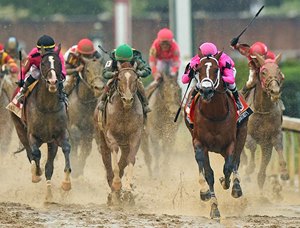Federal Judge Dismisses Derby Disqualification Lawsuit


A federal judge has dismissed a lawsuit brought by owners Gary and Mary West seeking to overturn Maximum Security's disqualification from victory in the 2019 Kentucky Derby Presented by Woodford Reserve (G1).
In a decision posted Nov. 15, United States District Judge Karen Caldwell ruled that Kentucky regulations clearly state that disqualification decisions are not subject to judicial review, and, furthermore, the disqualification procedure does not implicate an interest protected under the due process clause of the Constitution.
"Accordingly, the court must grant the motion to dismiss," wrote Caldwell, judge for the U.S District Court in the Eastern District of Kentucky Central Division—Lexington.
The Wests filed the lawsuit in U.S. District Court May 14 after Maximum Security finished first in the May 4 Derby at Churchill Downs but was disqualified to 17th for interference near the 5/16ths pole. The litigation named the Kentucky Horse Racing Commission, commission staff, and the stewards—Kentucky chief steward Barbara Borden, Brooks "Butch" Becraft, and association steward Tyler Picklesimer—as defendants and referred to the disqualification of Maximum Security as a "bizarre and unconstitutional process."
But the judge ultimately sided with a June 8 filing by the KHRC asking the court to dismiss the case because it failed to state a claim upon which relief can be granted.
The judge noted that Kentucky regulations clearly assign responsibility for such decisions to the stewards and do not allow such judgment calls to be appealed. The Wests requested an appeal to the full commission that was denied because the regulations do not allow such an appeal.
The court noted the stewards are responsible for findings of fact on all matters during and incident to the running of a race, determining all objections and inquiries on interference by a horse, improper course by a horse, or jockey fouls, and all other matters occurring or incident to a race. They are responsible for determining the extent of disqualification, if any, of horses for a foul committed.
The judge noted Kentucky administrative regulations also provide that all these findings and determinations, including a horse’s disqualification for a foul committed during the race, are “final and shall not be subject to appeal.”
"The regulations were clear. This was non-appealable," KHRC executive director Marc Guilfoil said in a telephone interview Nov. 16. "That being said, it was the right call."
Attorneys for the Wests could not be immediately reached for comment. When contacted by BloodHorse, Gary West said he will make an official statement early next week.
The judge noted, "The stewards’ decision disqualifying Maximum Security was not the product of an administrative hearing. There was no formal adjudicatory proceeding. There is no provision in Section 4 or any of the other regulations governing the determination of fouls and disqualifications in the running of a horse race that requires a formal adjudicatory process with regard to such determinations."
The judge determined the Wests' due process rights were not violated. In terms of the issue of property rights, which the Wests' suit tied to the value of the purse, Caldwell ruled the Wests failed to meet a required standard that state policy, law, or mutually explicit understanding confers the benefit and limits the discretion of the (state) to rescind the benefit.
"The Wests fail to do this," Caldwell wrote. "In their response brief, the Wests argue there was a mutual understanding between them and the defendants that when the stewards determined whether to disqualify Maximum Security they would do so in strict conformity with the legal requirements of Section 12. This may establish a mutual understanding that the stewards would follow Section 12, but it does not establish a mutual understanding that the Wests would receive the benefits of winning the Kentucky Derby—the property interest that the Wests claim they were deprived of by the stewards’ decision."
Caldwell noted that while the litigation raised concerns about how the stewards arrived at their decision, and their actions after that decision, those concerns do not outweigh the stewards' discretion in determining fouls.
"This provision does not confer on the Wests the benefits of winning the Derby or limit the stewards’ discretion in determining who the winner of the Derby is," Caldwell wrote. "In fact, it grants the stewards complete discretion in determining whether a foul 'alters the finish of a race' and provides that, if in the stewards’ 'opinion' it did, then the stewards 'may' disqualify the offending horse."
The judge later noted the Wests had no property interest in the purse because it was not awarded until the stewards made the race official. Therefore, the Wests had no due process challenge regarding property.
"The Wests have not established that the defendants’ conduct deprived them of a protected life, liberty, or property interest," Caldwell said. "Accordingly, their procedural due process claim based upon how the stewards arrived at the decision to disqualify Maximum Security must be dismissed. For the same reason, the Wests’ vagueness challenge to Section 12 must also be dismissed."
The judge noted the litigation brought against the commissioners and KHRC staff was unwarranted.
